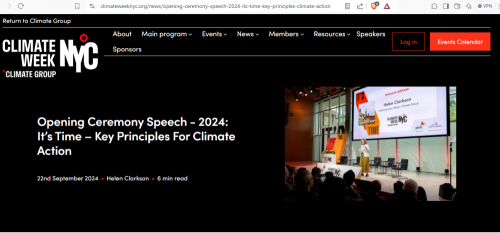https://www.climateweeknyc.org/news/opening-ceremony-speech-2024-its-tim...
Hello, and welcome to Climate Week NYC – it’s so good to see you here today at the Times Center in New York, and for those of you joining online, thank you so much for tuning in as well.
Firstly, I wanted to say a huge thank you to our partners, especially PWC, our Headline Partner and Saint-Gobain, our Opening Ceremony Partner. Without them, none of this would be possible.
This is the 16th Climate Week NYC and as usual we stand here looking back on a summer of increasingly dire climate impacts and looking ahead to crucial discussions that will happen throughout the Autumn.
Climate Week NYC often sounds the starting gun for what can feel like ‘climate season’ - the months when there's increased focus on our planet.
There's a lot of talk already about COP30 next year in Belem, as by then we’ll receive the new commitments from countries under the Paris Agreement. But we can’t focus on next year and just skip this year – there’s critical work that needs to happen at COP29. In fact, it shouldn’t be seasonal at all – climate should be at the heart of all international meetings at all levels – whether that’s the G7 or the G77, or bilateral meetings that happen this week at UNGA.
Today and this week, It’s Time to think about the crucial decisions and action we need to start taking right now, to leave COP30 with the world in better shape. So, our theme for this year is exactly that: It’s Time.
Because history will judge us. 100 years from now, people will say: they knew where they were heading, how many warnings from scientists did they need? How many people needed to die in heatwaves for them to really believe what was happening?
And the best they could do was just to go a bit slower? Why did no one actually pull the handbrake for a U-turn? So, this week when we say, “It’s Time”, here are five principles for what that means, and what we need to do right now, to change direction and get us on track.
It's Time to put people first
The transition must be just. It should keep the needs, priorities and realities of all communities top of mind.
Investment in renewables has reached record levels, and hopefully left fossil fuel investment in the rear-view mirrors of our electric cars. China is producing EVs and solar panels at an astonishing rate, the US and the EU have ambitious climate plans, and South Australia generates more than 70% of its electricity from renewable sources – good things are happening.
But the benefits can’t just be shared between a small, rich minority - they need to be felt by all, especially those who have contributed the least to climate change but are hardest hit by it. A just transition will upskill workers, provide decent jobs, and fair compensation where needed, guaranteeing livelihoods.












